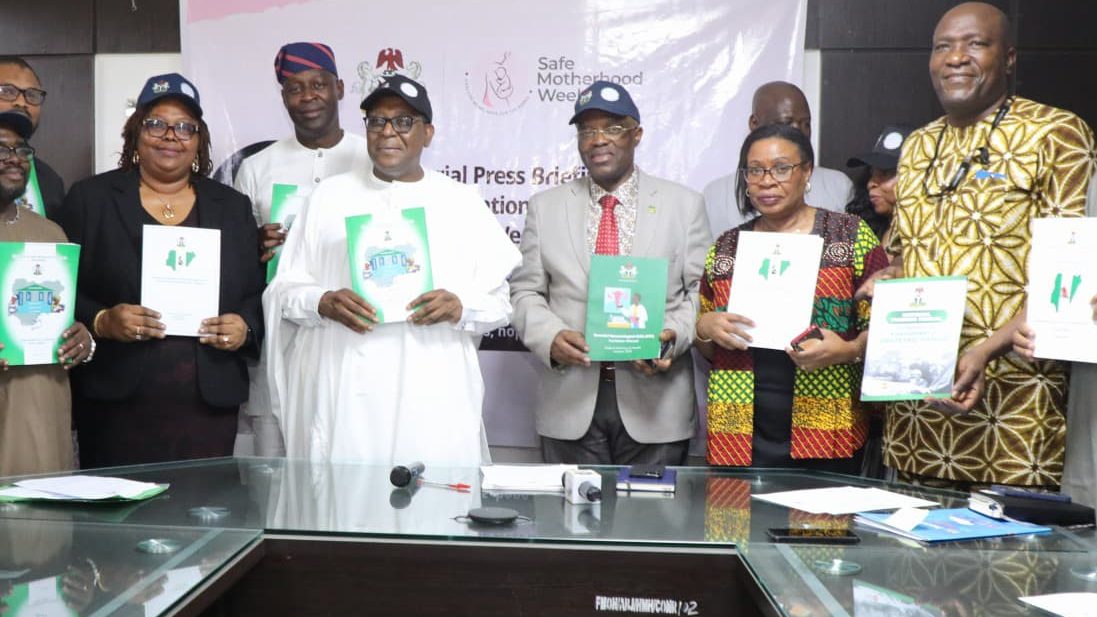By Muhammad Amaan
The Federal Government of Nigeria has rolled out six strategic policy documents and health interventions aimed at drastically reducing maternal and newborn deaths in the country.
Launching the documents in Abuja, the Coordinating Minister of Health and Social Welfare, Professor Muhammad Ali Pate said they were designed to enhance the skills of health workers and improve maternal care outcomes.
The policy documents include:
- The Safe Motherhood Strategy (2024-2028)– roadmap for coordinated, multi-level interventions to protect mothers’ lives. The document also has national quantification of maternal health commodities (2024-2028).
- Guidelines for the Management of Postpartum Haemorrhage (PPH) – to standardize lifesaving practices nationwide.
- Preeclampsia and Eclampsia Guidelines – Targeted strategies for timely detection and effective management of hypertensive disorders in pregnancy.
- Essential Gynaecological Skills Manuals – to enhance the competencies of health workers managing women’s reproductive health.
- The RMNCAEH+N Quality of Care Strategy – a framework to ensure respectful, rights-based, and high-quality care for women, newborns, children, adolescents, and the elderly.
- National Training Manual for Doctors and Nurses on the Management of Obstetric Fistula: to provide global standards, user-friendly training manual for doctors to provide holistic, respectful, simple, affordable, quality, and evidence-based care that will improve the quality of life for women and girls living with genital fistula.
Speaking on the theme “Innovating for Safer Birth: A Collective Responsibility to Crash Maternal Mortality,” the Minister said the 2025 commemoration offers a moment to reflect on the lives lost and recommit to building a health system where every mother and child survives and thrives.
“Safe motherhood is not merely a health agenda; it is a moral imperative, a cornerstone of sustainable development, and a critical measure of our national progress.
“For too long, maternal and newborn mortality has plagued our communities, robbed families of their futures and undermined our collective potential. But today, I am here before you to affirm that Nigeria is changing that narrative,” he stated.
Prof. Pate maintained that with the Health Sector Renewal Investment Initiative, significant progress has been made to strengthen primary health care, deploy more skilled birth attendants to underserved areas, expand health insurance coverage, and scale up free emergency obstetric care for vulnerable populations.
The Minister also revealed that 23 states were now part of the revamped National Emergency Medical Services and Ambulance System, with free fistula repair programme implemented in 15 health facilities across the country to restore dignity and improve the lives of affected women.
Prof. Pate therefore called on governors, healthcare professionals, traditional leaders, private sector players, and civil society to unite in the fight against maternal mortality.
“Let us ensure that no woman dies while giving life. Let us ensure that every child born in Nigeria takes their first breath in safety and with hope,” he urged.
Country Representative of World Health Organization (WHO), Dr Walter Kazadi Mulombo, commended the Nigerian government for adopting the Sector-Wide Approach (SWAP), which promotes unified planning, budgeting, reporting, and accountability across the health system.
He also appreciated the Borno State Government for the recent launch of the Safer Birth Bundle of Care initiative, an evidence-based approach that significantly lowered maternal deaths in Tanzania.
Dr Mulombo emphasized the need for government at all levels to deepen investment in maternal health services, especially in hard-to-reach communities where women and newborns face the highest risks.
He noted the alignment of Safe Motherhood Day with World Health Day, both of which this year focused on improving maternal and newborn health outcomes.
Dr Mulombo reaffirmed the commitment of WHO and other partners to supporting Nigeria’s path toward safer motherhood for all.
Earlier, the Permanent Secretary, Federal Ministry of Health and Social Welfare, Ms Daju Kachollom said ‘Safe Motherhood Day’ is not just a day of reflection, but a rallying call to action.
Ms Kachollom noted that maternal mortality remains a tragic reality for many Nigerian families, and addressing it would require urgency and collective effort.
The Permanent Secretary, represented by the Director of Family Health in the ministry, Dr. Binyerem Ukaire, commended the gains made under the Health Sector Renewal Initiative, and noted that strategic investment and improved coordination were already yielding results.
Commemorated annually on April 11, Safe Motherhood Day raises awareness about maternal health and ensures all women receive the care they need to be safe and healthy throughout pregnancy and childbirth.
This year’s slogan, “Care for Moms, Hope for Babies,” stakeholders explained, emphasized the vital connection between a mother’s health and her child’s survival and future.




